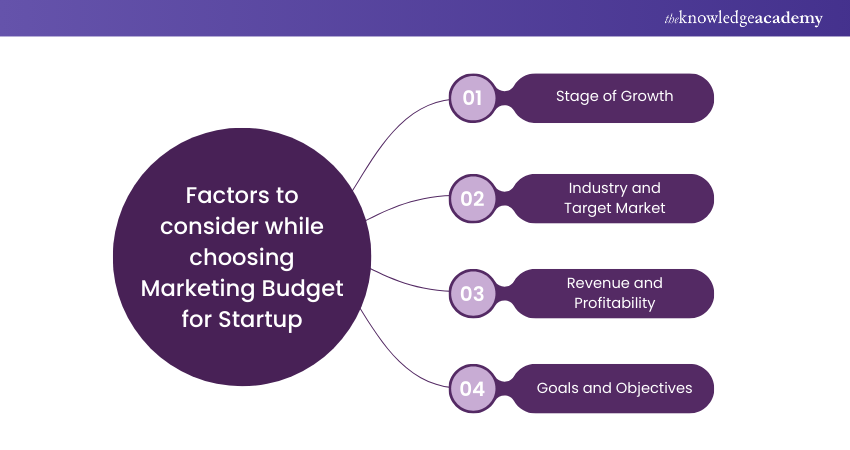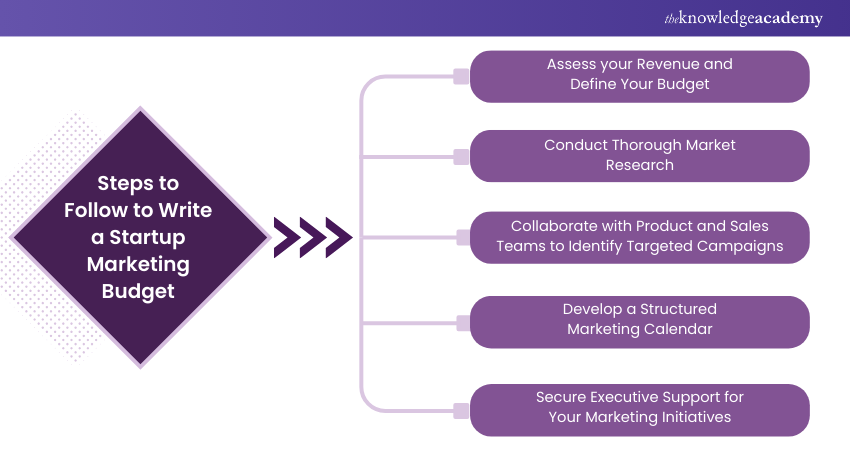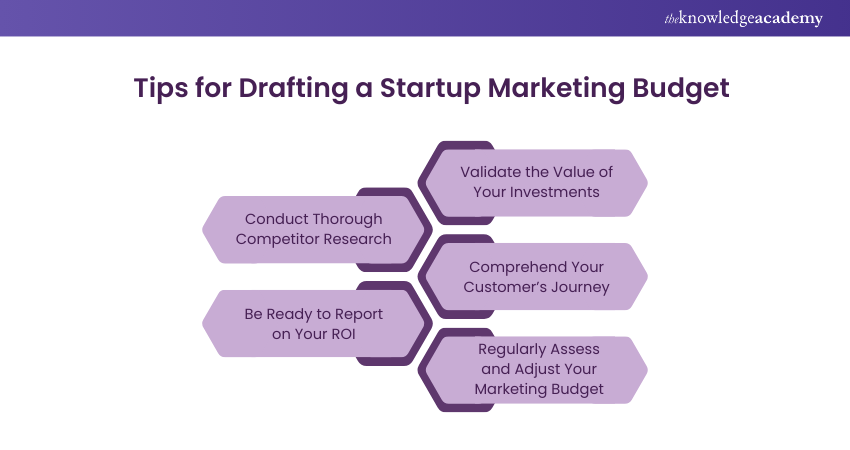We may not have the course you’re looking for. If you enquire or give us a call on +44 1344 203999 and speak to our training experts, we may still be able to help with your training requirements.
We ensure quality, budget-alignment, and timely delivery by our expert instructors.

When you hit the road as a startup owner, there are many vital prerequisites to consider, and the marketing budget ranks as the most significant among them. Think of it as the fuel that keeps your business engine running. But you need to know how to fill your tank wisely, ensuring that you have enough to accelerate growth without the risk of burning out.
This blog is your trusty companion in this journey as it explores the key components of a Startup Marketing Budget. From choosing the right fuel (strategies) to optimising your ROI mileage, learn the best tips on creating the perfect marketing budget for your startup.
Table of Contents
1) Choosing the Optimal Marketing Budget for Startups
2) How to Create a Startup Marketing Budget?
3) Pro Tips for Drafting a Startup Marketing Budget
4) Factors that Influence Your Marketing Strategy and Budget
5) Conclusion
Choosing the Optimal Marketing Budget for Startups
Figuring out how much you can spend on marketing is one of the first steps in creating a Startup Marketing Budget. There's no one-size-fits-all answer to this question because different startups can have different goals, needs, and resources. However, you can consider some general factors and guidelines when finalising the marketing budget.

a) Stage of Growth:
a) Early Stage: Higher spending to generate awareness and feedback.
b) Scaling Stage: Focus on optimising channels and increasing conversion rates.
b) Industry and Target Market:
a) Competitive/Saturated Market: Higher investment to stand out.
b) Niche/Emerging Market: Lower spending, leverage referrals and word-of-mouth.
c) Revenue and Profitability:
a) Aim for a positive ROI.
b) Measure CAC (Customer Acquisition Cost) and CLTV (Customer Lifetime Value).
c) Target a CLTV/CAC ratio of at least 3:1.
d) Goals and Objectives:
a) Brand Awareness: Allocate more to content marketing, social media, and PR.
b) Lead Generation/Sales: Invest in email marketing, PPC, and SEO.
|
Factor |
Early Stage |
Scaling Stage |
|
Stage of Growth |
Higher spend for awareness/feedback |
Optimise channels, increase conversions |
|
Industry/Market |
Competitive: Higher spend |
Niche: Lower spend, use referrals |
|
Revenue/Profitability |
Positive ROI, CLTV/CAC ≥ 3:1 |
|
|
Goals/Objectives |
Awareness: Content, Social, PR |
Leads/Sales: Email, PPC, SEO |
How to Create a Startup Marketing Budget?
Once your marketing spending has been decided on, the next step is to write a Startup Marketing Budget that outlines your potential expenditure. This budget is a document that details your marketing strategy, activities, costs, channels, and predicted outcomes. It lets you plan and execute your marketing campaigns and track your performance and results. Here are some steps you can follow to write an impactful Startup Marketing Budget:

Assess Your Revenue and Define Your Budget
The guidelines and factors discussed in the previous section can help you with this step. Additionally, it's essential to consider your cash flow and expenses to guarantee sufficient funding for your marketing activities. It is highly recommended that you employ a spreadsheet or a software application to formulate your budget and monitor your expenditures.
Conduct Thorough Market Research
This step involves in-depth market analysis to grasp your target audience's needs, competitors' strategies, and industry trends. The knowledge gained from this analysis will help pinpoint the most effective marketing channels and strategies to attract and connect with prospective customers and stand out from your competition.
Learn how to optimise your business website’s content efficiently through our Conversion Rate Optimisation Training – Sign up now!
Collaborate with Product and Sales Teams to Identify Targeted Campaigns
The third step involves collaboration with your product and sales teams to identify your Startup's most effective marketing campaigns. It's essential to synchronise your marketing objectives with those of your product and sales. Additionally, you can develop a buyer persona that epitomises your ideal customer.
A buyer persona is a fictional profile that describes your customer’s behaviour, demographics, needs, pain points, and motivations. You can use it to align your marketing messages with your customer’s preferences.
Develop a Structured Marketing Calendar
An important step is to create a structured marketing calendar that outlines your marketing timelines, activities, and responsibilities. This calendar is a visual tool that helps you organise and schedule your marketing campaigns and ensure they are executed within time and budget. You can use a spreadsheet, a calendar app, or a software tool to create your marketing calendar and share it with your team.
Secure Executive Support for Your Marketing Initiatives
The final step involves securing executive support for your marketing initiatives. Communicating your marketing plan and budget to your senior management and stakeholders and gaining their approval and buy-in will seal the deal. You must also regularly report your marketing progress and demonstrate how your marketing efforts contribute to the overall business objectives.
Explore diverse marketing disciplines in our Marketing Courses – Join now to expand your expertise!
Pro Tips for Drafting a Startup Marketing Budget
Managing a Startup Marketing Budget can be challenging, especially with limited experience and resources. However, there are some pro tips and best practices that can help you draft a budget that works for your business. We explore them below:

Validate the Value of Your Investments
a) Experiment with Diverse Channels: Test various marketing channels and measure their effectiveness.
b) Track KPIs: Monitor key performance indicators like clicks, impressions, conversions, sales, leads, revenue, and ROI.
c) Optimises Budget: Focus on the most profitable and scalable channels.
Conduct Thorough Competitor Research
a) Analyses Competitors: Study competitors’ marketing strategies, tactics, channels, activities, costs, and results.
b) Identify Gaps: Look for market gaps and opportunities to exploit.
c) Avoid Inefficiencies: Learn from competitors’ failures to avoid wasting funds.
Comprehend Your Customer’s Journey
a) Understand Customer Stages: Know how customers move from awareness to consideration, decision, retention, and advocacy.
b) Map Touchpoints: Identify customer interactions with your brand to influence their actions.
c) Align Budget: Create a customer-centric budget that drives loyalty and retention.
Be Ready to Report on Your ROI
a) Collect Data: Have a system for collecting, organising, and presenting marketing data.
b) Use Visualisation Tools: Utilise dashboards, charts, graphs, and reports to communicate performance.
c) Justify Spending: Demonstrate marketing impact and value to secure resources and support.
Regularly Assess and Adjust Your Marketing Budget
a) Periodic Reviews: Compare actual spending and results with planned budget and expectations.
b) Evaluate Outcomes: Assess marketing performance against benchmarks and goals.
c) Optimise Budget: Adjust the budget based on changing needs, goals, and circumstances to ensure alignment with business objectives.
Master the art of budgeting for marketing excellence – Sign up for the Marketing Budget Course!
Factors that Influence Your Marketing Strategy and Budget
It’s essential to weigh the diverse factors that influence your marketing strategy and budget. Here we explore the nine most important factors that can impact your Startup Marketing Budget.

Sales Cycle
a) Long Sales Cycle: Allocate more funds to lead generation to keep prospects engaged and moving through the funnel.
b) Short Sales Cycle: Prioritise driving conversions and repeat business to maximise efficiency.
Competitor Behaviour
a) New Product Launch by Competitors: Enhance your marketing efforts to stay top-of-mind and retain market share.
b) Heavy Advertising by Competitors: Allocate additional funds to keep up with competitors’ marketing tactics.
Market Saturation and Market Size
a) Crowded Market: Allocate more funds to stand out in a highly competitive environment.
b) Smaller Market: Less investment is needed due to lower competition levels.
Revenue Per Customer
a) High Revenue Per Customer: Allocate more funds towards marketing efforts to capitalise on high returns.
b) Low Revenue Per Customer: Proceed cautiously with marketing spend to ensure cost-effectiveness.
Product/Service Price
a) High-Priced Offerings: Allocate more funds to reach and engage your target audience effectively.
b) Low-Priced Offerings: Allocate less towards marketing efforts as the cost of customer acquisition is lower.
Entry Barriers
a) High Entry Barriers: Balance marketing funds with other business needs, such as infrastructure investment, to justify the investment to your target audience.
Switching Costs
a) High Switching Costs: Allocate additional funds to ease the transition for customers switching from an existing provider.
Retention Rates
a) Low Retention Rates: Invest more in customer retention efforts, including customer service initiatives, loyalty programs, and targeted email campaigns.
Customer Acquisition Cost (CAC)
a) High CAC: Allocate more funds to reduce the cost of acquiring new customers and improve your Return On Investment (ROI).
Conclusion
In conclusion, a marketing budget can help you plan and implement your startup's marketing strategy as efficiently as possible. However, creating and overseeing a budget for a startup can be challenging, mainly when resources and experience are scarce. This blog's guidelines will help you write a Startup Marketing Budget that aligns with diverse aspects of your business goal.
Craft winning marketing strategies with our Business Marketing Strategies Training– Join to drive growth and success!
Frequently Asked Questions

CAC is the money spent on acquiring a new customer, and CLTV is the revenue you expect to earn from a customer over their lifetime. CAC is calculated by dividing your total marketing and sales costs by the number of new customers you gained in a given period.

Your startup's marketing tactics and channels depend on your objectives, budget, target industry, market, and audience. Here are some of the most popular and current marketing channels for startups are:
a) Content Marketing
b) Social Media Marketing
c) Email Marketing
d) SEO
e) PPC

The Knowledge Academy takes global learning to new heights, offering over 30,000 online courses across 490+ locations in 220 countries. This expansive reach ensures accessibility and convenience for learners worldwide.
Alongside our diverse Online Course Catalogue, encompassing 17 major categories, we go the extra mile by providing a plethora of free educational Online Resources like News updates, Blogs, videos, webinars, and interview questions. Tailoring learning experiences further, professionals can maximise value with customisable Course Bundles of TKA.

The Knowledge Academy’s Knowledge Pass, a prepaid voucher, adds another layer of flexibility, allowing course bookings over a 12-month period. Join us on a journey where education knows no bounds.

The Knowledge Academy offers various Marketing Course, including Marketing Budget, Intergrated Marketing and Business Marketing Strategies Courses. These courses cater to different skill levels, providing comprehensive insights into What is Business Marketing and its Types.
Our Digital Marketing Blogs cover a range of topics related to Marketing, offering valuable resources, best practices, and industry insights. Whether you are a beginner or looking to advance your Digital Marketing skills, The Knowledge Academy's diverse courses and informative blogs have you covered.
Upcoming Digital Marketing Resources Batches & Dates
Date
 Introduction to Marketing Training
Introduction to Marketing Training
Fri 28th Feb 2025
Fri 4th Apr 2025
Fri 16th May 2025
Fri 11th Jul 2025
Fri 19th Sep 2025
Fri 21st Nov 2025







 Top Rated Course
Top Rated Course



 If you wish to make any changes to your course, please
If you wish to make any changes to your course, please


